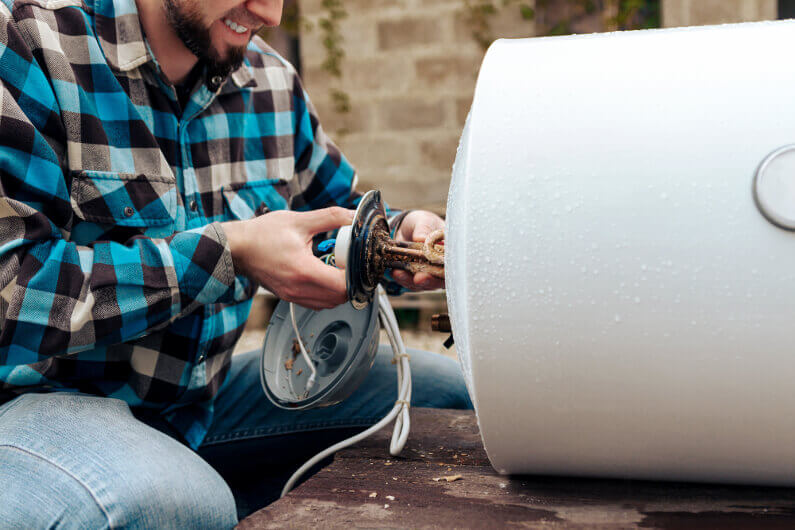There’s a sinking feeling you get when you step into the shower on a chilly day, and there is no hot water.
The same feeling occurs when you take a look in your garage or basement, only to find your water heater leaking.
Your water heater is an appliance that is usually out-of-sight, and out-of-mind until something goes wrong. Then, it is important to address the problem, as even the smallest leak can turn into a much larger water issue.
Read on to find out what to watch out for before water heater leaking occurs, and what to do when it does.
Warning Signs
Being proactive will help you find potential water heater problems before they get out of hand causing major water damage. Here are several signs to be aware of when assessing the condition of your water heater:
Age: The average water heater lasts @10 years, and some gas models less than that. If you don’t know the age, check the serial number, located on the manufacturer’s sticker on the tank. Be aware that the older the heater, the more likely it will simply leak from wear.
Rust: The appearance of rust is a sure sign of trouble. If the water coming out is rusty, or there is obvious rust on the unit’s surface, or around the valve or inlet, it is likely it will be time to replace your heater.
Noise: as a heater works over the years, sediment can build up in the bottom of the unit, causing audible noise. While flushing the tank might solve this problem, if it reoccurs quickly, it’s time to replace the heater.
Causes of Water Heater Leaking
There are a few possible causes for leaking in a water heater. To find the cause of the leaking, look for where water is pooling.
Water heater leaking from TOP: indicates that the water inlet or outlet valve may be loose or rusty, as well as their fittings (often called nipples.) Tightening these may be all the fix you need, but if leaks continue, these valves and nipples will need to be replaced.
Inspect the temperature and pressure relief valve, usually located on the top. If there is water running from that valve down the sides, the valve needs replacement, or there is too much pressure in the tank, which is a more serious problem.
Water heater leaking from BOTTOM: check the drain valve, near the bottom to see that it’s completely closed and not wet. If this checks out, your internal tank is most likely the cause of the leak, and replacement will be needed.
What To Do When You See a Leak
Start by turning off the water to your tank via the shutoff valve on your cold inlet pipes. If you cannot locate that valve, shut the water off to the house via the main water valve.
Next, turn off all power to the unit. Electric power should be shut off at the breaker, and gas should be shut off at the gas valve leading to the unit.
Check for the location of the leak, looking for excess water, and tightening connections as described above.
In addition to inspecting the top and bottom of the tank as mentioned earlier, make sure your thermostat is reading between 120 and 140 degrees. If it is higher, the pressure in the tank will build up and cause cracks or leaks. If lower, then you have a problem with the thermostat or the actual heating element.
Calling a Professional
If you cannot fix the leak yourself with a simple tightening of connections, then it is time to call a professional plumber to address the leak.
Your plumber may try flushing the heater to remove any sediment present, and this may stop the leaking. Faulty valves, nipples, and other connections may be replaced, which is fairly inexpensive.
Finally, if all the above fails to stop the water heater leaking, a new unit will need to be installed. There are many new types of water heaters on the market. These will have a a varying degrees of costs. Your plumber can recommend the right type of heater depending on your water usage patterns, and budget.
Preventive Maintenance
To ward off potential leaks in the future, get in the habit of checking all water heater pipes and valves for leaks and drips regularly. Check under the water heater for rust.
Draining some of the water from the bottom spout on the heater and into a bucket from time to time can help rid your heater of mild sediment buildup and minimize corrosion.
Experts also recommend having your heater checked each year by a professional plumber. That check-up should include firstly flushing the sediment out of the tank. Followed by checking the pipes and connections, and an overall inspection of all parts.
A draining tray placed underneath your water heater will help catch any leaks before they stain or damage your floor.
Before You Buy
If you have to purchase a new heater, make sure you know what size tank you need in your home. Experts say that you want to calculate how much HOT water you need in one hour of peak usage.
Make sure you don’t buy a tank that won’t fit in the space you have allotted.
Water heaters with an Energy Star Rating, indicated on the tank, will save you energy costs over the long run, even though they may cost a little more up-front.
As with any other major purchase, look for reviews of the different brands. Be sure to check with unbiased sources, as well as friends and family. Word of mouth is usually the best advertisement for great products.
Don’t Delay When Water Heater Problems Occur
Now that you know how to spot your water heater leaking you are better prepared, Make sure you take action to address it as soon as it appears. This will greatly help avoid the risk of major water damage to your home.
If you’re looking for a professional plumber in the Columbia, S.C area, contact us for service, advice, and installation of your water heater.










